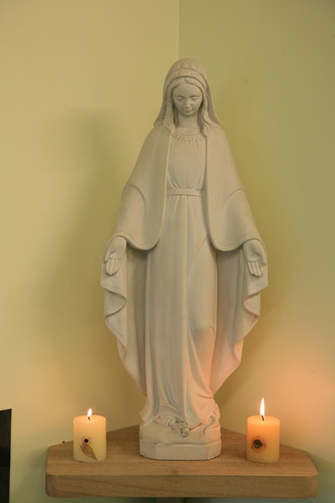Spiritual, Moral, Social and Cultural Development

At St. Mary's we develop our pupil's spiritual, moral, social and cultural development through our everyday teaching and whole school rules, routines and practice. The personal development of pupils, spiritually, morally, socially and culturally, plays a significant part in their ability to learn, achieve and have a positive impact on a child’s self-esteem and well-being.
All of our curriculum areas have a contribution to make to a child’s spiritual, moral, social and cultural development.
At St. Mary's Catholic Primary School, we are committed to the development of the whole child, and it is key to our children's education at St. Mary's. Our vision that our children develop a strong spiritual and moral identity in a loving, nurturing environment is underpinned by our Catholic faith
Spiritual Development
Through our RE,PHSE and RSE pupils are taught to reflect on their own beliefs and to respect the faiths, feelings and values of others. Classes learn about other faiths during the school year.
There are frequent opportunities for prayer and quiet reflection throughout the school day including
daily collective worship, class prayers, Masses and liturgies, church visits, assemblies, quiet reflection in our prayer area, opportunities to take part in the sacrament of reconciliation and through music and sining.
Children also learn to develop spiritually through all curriculum subjects from the Early Years through to year 6.
Moral Development
Our school ethos, teaching, school rules and Behaviour Code/Policy support the rule of English civil and criminal law. We work closely with local public service workers (including the police and fire brigade) teaching pupils to respect the work that they do and developing an understanding that we live under the rule of law for the protection of all. This work includes safety workshops, a Citizenship Day for Year 6 and the Community Police visit the Key Stage 2 children each year to do a range of different talk including internet safety.
Our everyday practice teaches children to recognise the difference between right and wrong.
Our whole school Behaviour Policy teaches the children that there are consequences of their behaviour and actions (including sanctions if they make the wrong choices).
Pupils investigate stories with morals and ethical issues through their RE lessons, PHSE, RSE, Books they read in English, assemblies, child-led worship and collective worship.
The children find out about inspirational people from history, including Mother Teresa and Nelson Mandela whilst debating ethical issues.
Social Development
Children in the Early Years spend a lot of time developing social skills and helping pupils to build good relationships.
Social and other life skills are developed through everyday practice. Social skills such as turn taking are developed in class through group/paired work and various class debates. Pupils are given the opportunity to work with lots of different groups, including children from different abilities, religious, ethnic and socio-economic backgrounds.
Pupils who have problems developing particular social skills are supported through social skills groups, Attention Hillingdon, social stories and other interventions. We work closely with outside agencies such as the Hillingdon Speech and Language Team and Hillingdon Early Years Support team.
A range of extra-curricular activities are offered at St. Mary's and all pupils are encouraged to take part. Parents and pupils are signposted to various events in the community through fliers sent home and information included in our weekly newsletter.
All pupils are given jobs to do in class. Older junior children have responsibility and jobs such as helping the Early Years at lunchtime, being play leaders. Through our PSHE and RSE pupils are taught to cooperate with others and how to deal with conflict. Our Friendship and Internet Safety Weeks are used to promote a caring ethos in our school.
At playtimes, staff help the children to learn to play together happily and take turns in games and develop socially.
Assemblies and child-led worship, collective worship in class are all times we help and support the children with their social development.
The children are actively encouraged to have a voice in school. We also have an Eco Committee who debate ethical issues, striving to make our school a more environmentally friendly place.
Cultural Development
Through our Geography and History work, pupils are given an understanding and appreciation of how a wide range of cultural influences have shaped their own heritage and that of others.
The children have done work on anti-racism and the role they play in preventing racism in our world.
Children have done assemblies for the school to teach them about different countries. For example, children did an assembly on Kenya and spoke about the food leaders, religion, music etc.
During our One World Week, pupils reflect on the range of different cultures within our school. Pupils are invited to share their nationality and experiences of their family life and to come to school dressed in clothes associated with their nationality. This prepares pupils for life in modern Britain. Each class studies the culture of another country in more detail, and they share this with other classes as a part of our Passport Day.
Through their Citizenship work, pupils in KS2 explore the strengths, advantages and disadvantages of democracy. As part of the curriculum, they learn about different cultures.
We offer a variety of clubs in school and actively encourage all pupils to participate. We take part in wider community events including borough sports competitions and actively encourage our pupils to act as responsible role models for our school.
At our summer fair, we celebrate different food from around the world and many parents cook traditional food from their country to share at the fair. Parents go to school and read to the children in their home language and speak about their home country.
Through assemblies, prayer and worship we talk about respecting each other and celebrating the different cultures.
